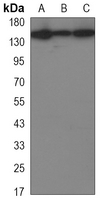Product Name :
BAF155 monoclonal antibody Background :
ATP-dependent chromatin remodeling complexes play an essential role in the regulation of nuclear processes such as transcription and DNA replication and repair. The SWI/SNF chromatin remodeling complex consists of more than 10 subunits and contains a single molecule of either BRM or BRG1 as the ATPase catalytic subunit. The activity of the ATPase subunit disrupts histone-DNA contacts and changes the accessibility of crucial regulatory elements to the chromatin. The additional core and accessory subunits play a scaffolding role to maintain stability and provide surfaces for interaction with various transcription factors and chromatin. The interactions between SWI/SNF subunits and transcription factors, such as nuclear receptors, p53, Rb, BRCA1, and MyoD, facilitate recruitment of the complex to target genes for regulation of gene activation, cell growth, cell cycle, and differentiation processes. Asymmetric dimethyation of SMARCC1/BAF155 by CARM1 was found to be associated with genes upregulated by c-Myc and breast cancer progression. Furthermore, asymmetric dimethylated SMARCC1/BAF155 was found to be associated with chromatin independent of SWI/SNF ATPases Brg1 and BRM, suggesting a subcomplex capable of affecting chromatin state. Indeed, unmethylated SMARCC1/BAF155 seems to play a role in development as it more closely associates with Brg1 during development, which reduces pluripotency. Product :
Liquid in PBS containing 50% glycerol, 0.5% BSA and 0.02% sodium azide, pH 7.3. Storage&Stability :
Store at 4°C short term. Aliquot and store at -20°C long term. Avoid freeze-thaw cycles. Specificity :
Recognizes endogenous levels of BAF155 protein. Immunogen :
Purified recombinant human SMARCC1 protein fragments expressed in E.coli. Conjugate :
Unconjugated Modification :
Unmodification
BAF155 monoclonal antibody Background :
ATP-dependent chromatin remodeling complexes play an essential role in the regulation of nuclear processes such as transcription and DNA replication and repair. The SWI/SNF chromatin remodeling complex consists of more than 10 subunits and contains a single molecule of either BRM or BRG1 as the ATPase catalytic subunit. The activity of the ATPase subunit disrupts histone-DNA contacts and changes the accessibility of crucial regulatory elements to the chromatin. The additional core and accessory subunits play a scaffolding role to maintain stability and provide surfaces for interaction with various transcription factors and chromatin. The interactions between SWI/SNF subunits and transcription factors, such as nuclear receptors, p53, Rb, BRCA1, and MyoD, facilitate recruitment of the complex to target genes for regulation of gene activation, cell growth, cell cycle, and differentiation processes. Asymmetric dimethyation of SMARCC1/BAF155 by CARM1 was found to be associated with genes upregulated by c-Myc and breast cancer progression. Furthermore, asymmetric dimethylated SMARCC1/BAF155 was found to be associated with chromatin independent of SWI/SNF ATPases Brg1 and BRM, suggesting a subcomplex capable of affecting chromatin state. Indeed, unmethylated SMARCC1/BAF155 seems to play a role in development as it more closely associates with Brg1 during development, which reduces pluripotency. Product :
Liquid in PBS containing 50% glycerol, 0.5% BSA and 0.02% sodium azide, pH 7.3. Storage&Stability :
Store at 4°C short term. Aliquot and store at -20°C long term. Avoid freeze-thaw cycles. Specificity :
Recognizes endogenous levels of BAF155 protein. Immunogen :
Purified recombinant human SMARCC1 protein fragments expressed in E.coli. Conjugate :
Unconjugated Modification :
Unmodification
-
 Western blot analysis of BAF155 expression in K562 (A), Jurkat (B), Hela (C) whole cell lysates.
Western blot analysis of BAF155 expression in K562 (A), Jurkat (B), Hela (C) whole cell lysates.
Bioworld Biotech only provide peptides for our antibodies and do not provide additional peptide customization services.
Price/Size :
USD 368/1mg/vial
Tips:
For phospho antibody, we provide phospho peptide(0.5mg) and non-phospho peptide(0.5mg).Describe :
Blocking peptides are peptides that bind specifically to the target antibody and block antibody binding. These peptide usually contains the epitope recognized by the antibody. Antibodies bound to the blocking peptide no longer bind to the epitope on the target protein. This mechanism is useful when non-specific binding is an issue, for example, in Western blotting (WB) and Immunohistochemistry (IHC). By comparing the staining from the blocked antibody versus the antibody alone, one can see which staining is specific; Specific binding will be absent from the western blot or IHC performed with the neutralized antibody.Formula:
Synthetic peptide was lyophilized with 100% acetonitrile and is supplied as a powder. Reconstitute with 0.1 ml DI water for a final concentration of 10 mg/ml.The purity is >90%,tested by HPLC and MS.
Storage:
The freeze-dried powder is more stable. For short time at 2-8°C. For long term storage store at -20°C.
Note :
This product is for research use only (RUO only). Not for use in diagnostic or therapeutic procedures.
 BAF155 monoclonal antibody
BAF155 monoclonal antibody  Datasheet
Datasheet COA
COA MSDS
MSDS SHIP
SHIP